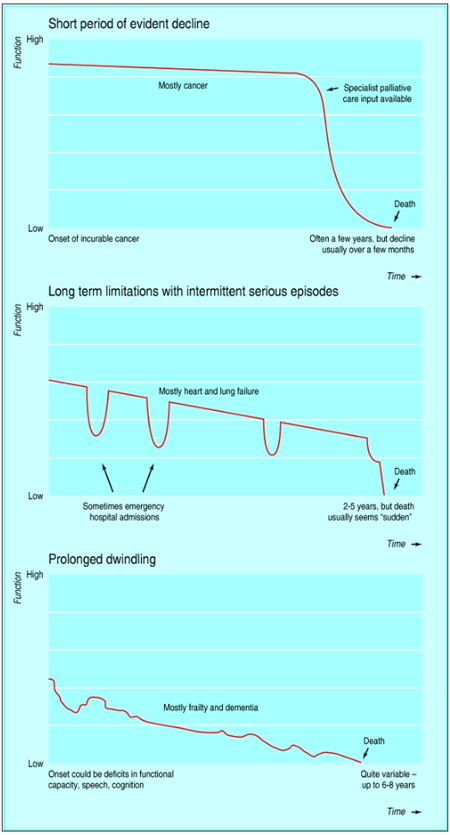We will now explain the different terms you may come across in relation to Heart failure (HF).
Disclaimer – from this point onward the module will look only at Left Ventricular Systolic Dysfunction (LVSD) : as this is the condition that the evidence-based guidelines support.
SIGN Guideline 147: Management of chronic heart failure PDF
NICE Guideline NG106: Chronic heart failure in adults: diagnosis and management
European Society of Cardiology: Acute and Chronic Heart Failure Guidelines
 The difficulties in predicting heart failure trajectory is well evidenced. (Living & Dying Well, A National Action Plan for Palliative and end of life care in Scotland. Scottish Government (2008)).PDF
The difficulties in predicting heart failure trajectory is well evidenced. (Living & Dying Well, A National Action Plan for Palliative and end of life care in Scotland. Scottish Government (2008)).PDF
Untreated, heart failure has a poor prognosis but this can be improved considerably with early intervention and optimal treatment.
Quality of life in those living with heart failure is often worse than any other long-term condition and the condition carries a worse prognosis than many cancers (Rogers et al 2000; Juenger et al 2002).
Within 5 years of diagnosis, up to 50% of patients with heart failure will be dead. Mortality rates among newly diagnosed patients are 6% in the first month, 11% in the first 3 months and 14% in the first 6 months (Cowie et al 2000).
One of the associated challenges with these figures is the unpredictability of heart failure trajectory (see table). Heart Failure is less predictable than many other terminal diseases, comparable to other forms of progressive organ failure. There are often periods of “near death” and recovery and the course of heart failure and time spent progressing through the illness is variable for each patient.
Definition of heart failure: A complex clinical syndrome of symptoms and signs that suggest impairment of the heart as a pump supporting physiological circulation. “It is caused by structural or functional abnormalities of the heart.”
NICE Clinical Guideline No 106 (September 2018)
Heart failure symptoms usually develop over weeks and months as the heart becomes weaker and less able to pump the blood that your body needs. Heart failure usually results in an enlarged heart (left ventricle).
It is a serious condition which cannot usually be cured but it can be treated. It can cause severe impairment of both physical and social functioning and decreased energy levels. Overall, quality of life in people with heart failure declines markedly as the severity of the disease increases.
For more information on cardiac output and anatomy please see Module 1.

Module authors
Module lead
Eve Shannon, Heart Failure Nurse/Educator, NHS Greater Glasgow & Clyde
Group members
Mandi Smith, Lead HF Nurse, NHS Highland
Gemma Craigie-Sharland, HF Support Lead, CHSS
David Holcombe, Benefits Advisor, NHS Fife/CHSS
Dr Aynsley Cowie, Physiotherapist Cardiac Rehabilitation, NHS Greater Glasgow & Clyde
Dr John Sharp, Cardiac/Psychology, NHS Greater Glasgow & Clyde
Paul Forsyth, Pharmacist, NHS Greater Glasgow & Clyde
Reviewers
Leslie Cruikshank, GP, Clinical Lead, NHS Forth Valley
Lynda Blue, BHF Project Lead, Scotland
Sinead McKee, Cardiac Practitioner, NHS Forth Valley
Frances Adamson, HF Nurse/Educator, NHS Grampian
Learning outcomes
- Define the term heart failure and be aware of the common causes.
- Identify heart failure symptoms and be aware of the NYHA tool and its relation to assessment of the patient’s symptoms.
- Develop an awareness of the pharmacological and non pharmacological management of heart failure.
- Be aware of advanced therapies and their role in the trajectory of heart failure.
- Recognise the psychological influences in caring for patients living with heart failure and their carers.
- Develop an awareness of the benefits and support for patients with heart failure and their families should be able to apply for.
General Medical Disclaimer: The information, including but not limited to, text, graphics, images, recommendations, opinions and other material contained on or accessed through this website (or in any module or content accessible through this website) (together “Website”), is intended for general informational purposes only. The information should not be considered as professional medical advice, diagnosis, recommendations or treatment. The information on this Website is provided without any assurance, representations or warranties, express or implied. We do not warrant that the information on this Website is applicable to all healthcare practices, geographical locations, health needs or circumstances. We do not warrant that the information on this module is complete, true, accurate, up-to-date, or non-misleading. You should always seek the guidance of a qualified healthcare professional before making any decisions related to your health or wellbeing. Never disregard or delay seeking medical advice due to something you have read on this Website. The use of or any reliance placed on any information provided on or accessed through this Website is solely at your own risk. If you have any specific questions or concerns about your health, please consult a qualified healthcare provider or other qualified medical professional. Do not rely on the information on this Website as an alternative to medical advice from your doctor or other qualified professional healthcare professional or healthcare provider.

This is the module test for ‘HEARTe 5. Cardiac rehabilitation’. It is strongly recommended that you work through the learning materials of the module prior to commencing this test. By going straight to the test you may miss out on valuable learning contained within the module. The answers to all the test questions are contained within the module. This information may have been provided in the ‘Additional Information’ boxes on some of the pages.
There are 10 questions and you must answer all of these correctly to obtain a certificate of completion.
You should allow approximately 10 minutes to complete the test.
Develop awareness of pathways for patients undergoing cardiac surgery within CR.
Recognise how behavioural change tools can enhance the patient’s journey through cardiac rehabilitation.
Michał is discharged and the Dr writes to his GP here and also to his medical care team in Poland.
 The difficulties in predicting heart failure trajectory is well evidenced. (
The difficulties in predicting heart failure trajectory is well evidenced. (



